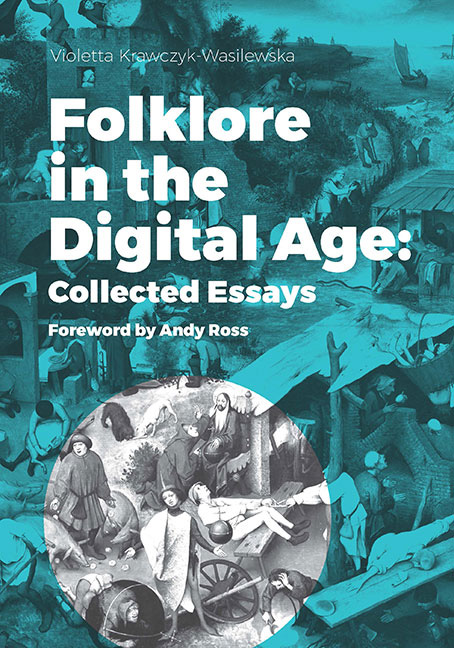Book contents
- Frontmatter
- Contents
- Acknowledgements
- Foreword
- I The Art of Bruegel and the Folklorist
- II e-Folklore as a Part of Digital Culture
- III Towards a Digital Folklore Heritage
- IV Post September 11: Global Fear vs Digital Humour
- V The Haiti Legends Revisited and the Power of e-Rumour
- VI The Global Dating Phenomenon
- VII Matchmaking through Avatars: Social Aspects of Online Dating
- VIII The Global Food Story and the Internet
- Bibliography
- Miscellaneous Endmatter
III - Towards a Digital Folklore Heritage
Published online by Cambridge University Press: 22 December 2017
- Frontmatter
- Contents
- Acknowledgements
- Foreword
- I The Art of Bruegel and the Folklorist
- II e-Folklore as a Part of Digital Culture
- III Towards a Digital Folklore Heritage
- IV Post September 11: Global Fear vs Digital Humour
- V The Haiti Legends Revisited and the Power of e-Rumour
- VI The Global Dating Phenomenon
- VII Matchmaking through Avatars: Social Aspects of Online Dating
- VIII The Global Food Story and the Internet
- Bibliography
- Miscellaneous Endmatter
Summary
Folklore and folkloristics
In many dictionaries and handbooks the folklore phenomenon has been described as traditional art, literature, everyday knowledge, and practices that are passed from generation to generation through oral communication, example and imitation. Folklore was transmitted diachronically (through centuries) and synchronically (within group milieux) and the information thus passed on expressed the shared ideas and values of a particular ethnic or social group.
The formal academic discipline devoted to the study of folklore is known as folkloristics, although it is sometimes also termed as folklife research and folklore studies. Because of its interdisciplinary character, folkloristics shares methodological approaches and insights with anthropology and ethnography, history and art, literature and linguistics, semiotics, musicology, etc. But unchangeably since its beginings the discipline of folkloristics has been always focused on collecting different kinds of folklore forms as evidence of everyday cultural knowledge and the collective memory of the group (‘folk’). The aim of ‘lore’ items collection is their preservation, because folklore is – ex definitione – a vanishing subject, and then its classification and systematisation (archives, inventories, repositories). The next stage is dealing with folklore items: its their interpretation, and presentation of research results.
Thus folkloristics contains studies on folklore as an historical artefact in the aspect of continuity (survival, revival); as ethnopoetry (folk genres, types, motifs), as well as research on folklore as a behaviour and a text of culture. In spite of folklore's lack of substance, the folklore itself – as an expression of culture and group identity – belongs to the cultural heritage of humanity. Looking back to folklorists’ achievements, they constantly participate in the process of identification, study, interpretation, protection, conservation and presentation of cultural heritage.
A definition of folklore and cultural heritage
Having in mind the definition of oral and intangible heritage, folklore masterpieces should be preserved, protected and safeguarded. The concept of cultural heritage safeguarding is linked to the notion of ethnic and cultural identity, and its modern connotations give rise to interesting issues surrounding the problem of identity and multiplied identities created by global multi-media. On the one hand lie considerations of human rights and acceptance of individual and collective identity. On the other, there are the social, political, and economic issues connected with progressive globalisation and the omnipotential cultural power of electronic devices.
- Type
- Chapter
- Information
- Folklore in the Digital Age: Collected Essays , pp. 39 - 56Publisher: Jagiellonian University PressPrint publication year: 2016



